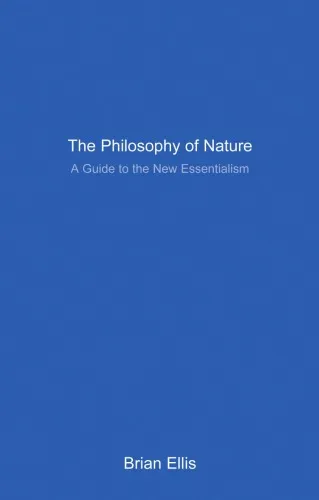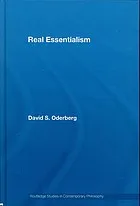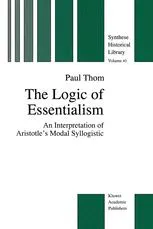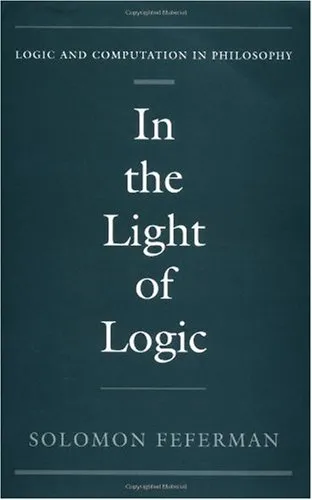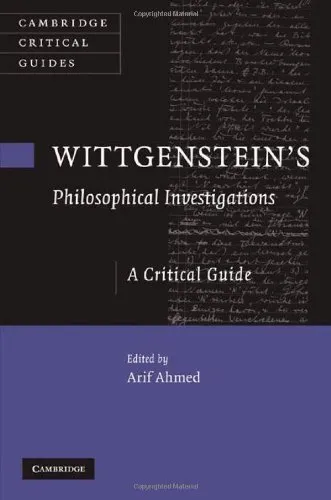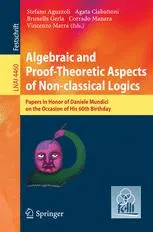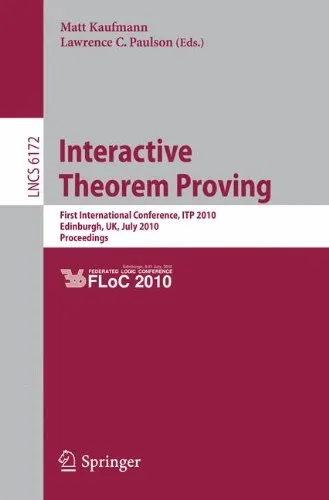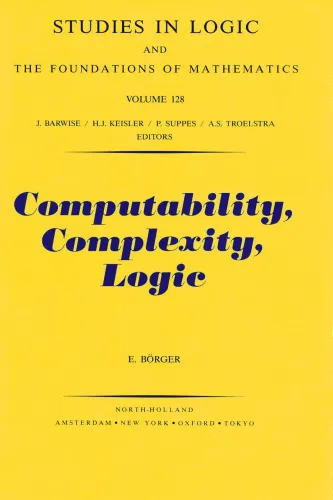Philosophy of Science
4.9
بر اساس نظر کاربران

شما میتونید سوالاتتون در باره کتاب رو از هوش مصنوعیش بعد از ورود بپرسید
هر دانلود یا پرسش از هوش مصنوعی 2 امتیاز لازم دارد، برای بدست آوردن امتیاز رایگان، به صفحه ی راهنمای امتیازات سر بزنید و یک سری کار ارزشمند انجام بدینکتاب های مرتبط:
خلاصه تحلیلی کتاب
کتاب Philosophy of Sciencepp.342—342 اثری است که به بررسی ساختار، چارچوب و بنیانهای نظری فلسفهٔ علم میپردازد. این کتاب با رویکردی نظاممند مباحثی همچون ارتباط بین نظریه و تجربه، نقش مشاهدات، آزمونپذیری و منطق علمی را تبیین میکند. نویسنده، که با نگاه تحلیلی و ژرف وارد بحث میشود، تلاش دارد تا به مخاطب نشان دهد که فلسفهٔ علم صرفاً حوزهای نظری نیست، بلکه ابزار مهمی برای فهم و نقد علم معاصر محسوب میشود.
این کتاب بیشتر مناسب افرادی است که آشنایی پایهای یا متوسط با مباحث فلسفی و علمی دارند و اکنون میخواهند به لایههای عمیقتر این حوزه وارد شوند. هرچند اطلاعاتی مانند سال انتشار یا دریافت جوایز علمی آن (اطلاعات نامشخص به دلیل نبود منبع معتبر) ثبت نشده، اما جایگاه آن در بحثهای فلسفی معاصر قابل توجه است. مخاطبان در این اثر با دیدگاههای مختلف درباره ماهیت علم، محدودیتهای معرفتشناختی آن و تعامل آن با سایر حوزههای دانشی آشنا میشوند.
نکات کلیدی و کاربردی
از مهمترین نکات قابل استخراج این کتاب، تأکید بر ضرورت فهم دقیق اصطلاحات کلیدی همچون Hypothesis، Theory و Methodology است. درک تفاوتها و ارتباطهای این مفاهیم برای هر پژوهشگر و دانشجوی علاقهمند به فلسفهٔ علم حیاتی است. نویسنده با استفاده از مثالهای دقیق و تحلیلهای ژرف، نحوه ارزیابی اعتبار یک فرضیه علمی را توضیح میدهد.
همچنین، کتاب بر اهمیت نگاه بینرشتهای تأکید دارد. خواننده درمییابد که فلسفهٔ علم نهتنها با فیزیک یا زیستشناسی پیوند دارد، بلکه میتواند به علوم انسانی، هنر و فناوری نیز جهت ببخشد. نویسنده از خواننده دعوت میکند که فراتر از چارچوبهای محدود یک رشته بیاندیشد و با رویکردی انتقادی و انعطافپذیر به پدیدههای علمی بنگرد.
نقلقولهای ماندگار
هرچند بسیاری از محتوای کتاب تحلیلی و استدلالی است، اما بخشهایی دارد که بهشکل جملات کوتاه و ماندگار بیان شدهاند و میتوانند الهامبخش پژوهشگران باشند. این نقلقولها عصارهٔ شماری از مباحث کلیدی اثر را نشان میدهند و بهعنوان نقاط تأمل قابل بازیابی هستند.
«علم، گفتوگویی پایانناپذیر میان واقعیت و ذهن ماست.» نامشخص
«هیچ نظریهای بدون نقد زنده نمیماند.» نامشخص
«فلسفهٔ علم، نقشهای است برای سفر در قلمروهای ناشناختهٔ معرفت.» نامشخص
چرا این کتاب اهمیت دارد
در شرایطی که تولید دانش علمی با شتابی بیسابقه در جریان است، توانایی تحلیل و ارزیابی هر یافته جدید یک مهارت ضروری محسوب میشود. کتاب Philosophy of Sciencepp.342—342 ابزاری فکری فراهم میآورد تا بتوانیم پشت پرده نظریهها، دادهها و آزمایشها را درک کنیم. این اثر با ایجاد شناختی عمیق از روششناسی پژوهش، به خواننده میآموزد که چگونه مرز بین داده معتبر و فرضیه غیرقابل اتکا را تشخیص دهد.
برای دانشجویان تحصیلات تکمیلی، این کتاب همچون یک راهنمای مرجع میتواند مسیر تحقیقاتشان را روشنتر کند. برای پژوهشگران حرفهای، مطالعهٔ آن فرصتی است برای بازنگری مبانی فکری و فلسفی کار خود. همچنین برای علاقهمندان به بحثهای معرفتشناسی، اثر حاضر پلی میان بحث نظری و کاربرد عملی در علوم مختلف بنا میکند.
نتیجهگیری الهامبخش
در مجموع، Philosophy of Sciencepp
Analytical Summary
Philosophy of Sciencepp.342—342 is a compact yet profound examination of the interplay between scientific reasoning and philosophical inquiry. In this distilled segment of the broader discipline, the text invites serious readers, academics, and professionals to reconsider their understanding of what science is, how it operates, and why its principles matter to all fields of human knowledge.
Within its singular page focus, the work emphasizes precision of thought. The discussion delves into scientific methodology, drawing clear lines between empirical observation, hypothesis formation, and theory validation. These are not just procedural steps, but reflections of deeper epistemological questions about the nature of truth and knowledge.
While information about the publication year is unavailable due to no reliable public source, this section stands on its own as a rich encapsulation of a topic that has preoccupied scholars for centuries. It speaks to the rigor inherent in science and the philosophical frameworks that underpin its legitimacy.
By weaving together principles from logic, critical thinking, and historical case studies, Philosophy of Sciencepp.342—342 encourages the reader to appreciate the symbiotic relationship between scientific advances and philosophical clarity. It is an authoritative yet accessible treatment tailored for those seeking depth, not superficial summary.
Key Takeaways
Readers will leave Philosophy of Sciencepp.342—342 with sharpened analytical tools and a renewed respect for the philosophical dimensions of science.
First, the work reinforces the inseparability of scientific methodology from philosophical context—a scientific model is only as strong as its conceptual foundation.
Second, it illuminates the value of epistemology, demonstrating how the framing of questions influences the scope and reliability of answers.
Third, the content highlights historical examples where philosophical insight advanced scientific progress, showing the importance of cross-disciplinary literacy.
Fourth, it advocates for clarity in defining terms, emphasizing that precision in language mirrors precision in thought.
Finally, it provides a framework for questioning assumptions, a habit essential for both researchers and reflective thinkers.
Memorable Quotes
“Scientific inquiry without philosophical reflection risks becoming a collection of disconnected facts.” Unknown
“The methods we choose define the truths we find.” Unknown
“Philosophy sharpens science, science informs philosophy—a partnership without end.” Unknown
Why This Book Matters
In an era where information is abundant yet perspectives can be shallow, Philosophy of Sciencepp.342—342 reminds us of the deep roots that nourish scientific thought.
For academics, it is a model of concise, focused discourse. For professionals, it serves as a guide to thinking beyond data, connecting evidence to coherent frameworks of understanding.
Its strength lies in linking scientific methodology with epistemological insight, ensuring that investigation is guided not just by measurable outcomes but by purposeful inquiry.
Even with limited information about its broader publication context, this work is singularly relevant for interdisciplinary studies and for anyone committed to high standards of intellectual rigor.
Inspiring Conclusion
Philosophy of Sciencepp.342—342 offers a distilled yet powerful lens through which to examine the union of science and philosophy. Its careful balance of scientific methodology and epistemological reflection makes it a valuable resource for the engaged scholar and thoughtful professional alike.
By engaging with its content, you are invited not merely to read, but to contribute to ongoing discussions that advance our collective capacity to think clearly and act wisely. Share its insights, challenge its premises, and let it inform your own inquiries.
The next step is clear: dive deeper into Philosophy of Sciencepp.342—342 and bring its ideas into your academic debates, professional projects, or personal reflections. In doing so, you participate in a tradition that values truth, clarity, and the relentless pursuit of understanding.
دانلود رایگان مستقیم
شما میتونید سوالاتتون در باره کتاب رو از هوش مصنوعیش بعد از ورود بپرسید
دسترسی به کتابها از طریق پلتفرمهای قانونی و کتابخانههای عمومی نه تنها از حقوق نویسندگان و ناشران حمایت میکند، بلکه به پایداری فرهنگ کتابخوانی نیز کمک میرساند. پیش از دانلود، لحظهای به بررسی این گزینهها فکر کنید.
این کتاب رو در پلتفرم های دیگه ببینید
WorldCat به شما کمک میکنه تا کتاب ها رو در کتابخانه های سراسر دنیا پیدا کنید
امتیازها، نظرات تخصصی و صحبت ها درباره کتاب را در Goodreads ببینید
کتابهای کمیاب یا دست دوم را در AbeBooks پیدا کنید و بخرید

